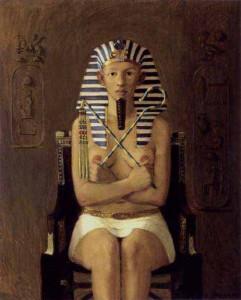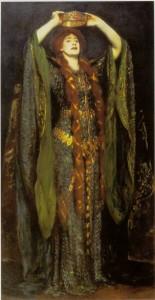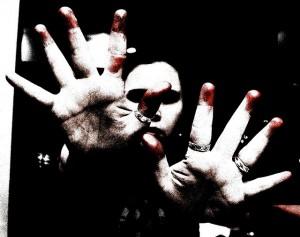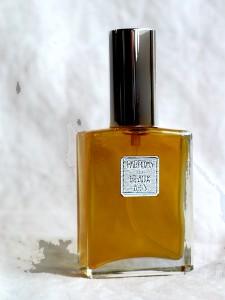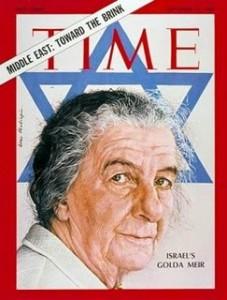Hatshepsut
March 8, 2011 was the 100th International Women’s Day, which gave me pause; why women have their own day (and men do not) and about how powerful women are and have been perceived throughout history. How many times have you heard, “she wears the pants in the family”? In 1490 BC Queen Hatshepsut crowned herself King or Pharaoh of Egypt as did Cleopatra and Nefertiti; they ruled in their own name.
Golda Meir (my personal favorite) comes to mind as the head of state for Israel. England has a history of self-ruling monarchs in Queen Elizabeth I, Queen Victoria, the double women’s whammy of Margaret Thatcher (who quipped 'I owe nothing to Women's Lib') and Queen Elizabeth II defined the UK in the 80s. Many of U.S. baby boomers can remember when Hillary Clinton was laughed at for her pantsuits as Bill Clinton had trouble keeping his pants zipped.
So do women’s rule? Yes. But I am convinced WilliamShakespeare was a sexist. After all in his will, Will gave his wife their second best bed. Where were pre-nups when you needed them? Shakespeare portrayed many strong female characters (this from the man who wrote “Frailty thy name is woman” about Hamlet’s own mother Gertrude) including Lady Macbeth of Macbeth, Portia from Merchant of Venice (let’s add anti-Semitic) and Kate from the Taming of the Shrew. But was he a sexist or a victim of his time. My vote is sexist, since Queen Elizabeth was on the throne in 1597 when he opened his Global Theatre.
Shakespeare portrays women as crafty, who use female methods of achieving power— that is, the notion of manipulation— to further their supposedly male ambitions. Women, the play implies, can be as ambitious and cruel as men, yet societal constraints deny them the means to pursue these ambitions on their own.
John Williams Waterhouse
Lady Macbeth is one of Shakespeare's most famous female characters. When we first see her, she is already plotting the current King's murder. She is stronger, more ruthless, and more ambitious than her husband. She may seem frightening, but she is frustrated; she will have to push her husband Macbeth into committing murder in order for him to become King.
Unsex me here,
And fill me from the crown to the toe topful
Of direst cruelty!
Macbeth Act 1, scene 5, 38–43
At one point, she wishes that she were not a woman so that she could do it herself (this is a recurrent theme examining the relationship between gender and power) and is key to understanding Lady Macbeth’s character. Her husband implies that she is a masculine soul inhabiting a female body, which seems to link masculinity to ambition and violence.
The deed is done by her husband Macbeth. But it is Lady Macbeth who calms her husband's nerves immediately after the murder. In short order, guilt begins to plague her and create a nightmarish existence .By the close of the play, we watch as this once sure and steady woman loses her mind; she is constantly and desperately trying to wash away an imaginary bloodstain. Lady Macbeth is unable to cope. Significantly, she (apparently) kills herself, signaling her total inability to deal with the aftermath of their crimes.
Lady Macbeth is all woman, and Shakespeare, seems to use her, and the Witches, (“something wicked this way comes”) to undercut Macbeth’s idea that “undaunted mettle should compose / Nothing but males” (I.vii.73–74). Shakespeare portrays women as crafty, who use female methods of achieving power— that is, the notion of manipulation— to further their supposedly male ambitions. Women, the play implies, can be as ambitious and cruel as men, yet societal constraints deny them the means to pursue these ambitions on their own.
"Here's the smell of the blood still;
all the perfumes of Arabia will not sweeten
this little hand. Oh, Oh, Oh!"
I chose Dawn Spencer Hurwitz’s Dirty Rose as the scent of Lady Macbeth, a natural fragrance in keeping with scents worn during the 17th century. The fragrance was first marketed to men, until DSH and I spoke about broadening its reach. It’s bizarrely beautiful, uniting the regal and feminine notes of Egyptian Rose Geranium, Centifolia Rose Absolute, Gallica Rose Otto with Virginia Cedar, Leather and Tobacco Absolute. And the perfumes of Arabia? They are Myrrh, Frankincense and Oud… creating a bewitching scented "un- i- sex me" brew.
–Michelyn Camen, Editor-in-Chief
Our draw is for 1 ounce EDP of DSH Dirty Rose. Please leave a comment about gender and power, Dawn Spencer Hurwitz, your favorite female ruler, whether Shakespeare is a sexist or a victim of his time, Lady Macbeth, and/or your favorite female head of state past or present. Draw ends March 11, 2011 at 2:00 p.m ESt. As a bonus the commentor who can name the most actors, directors and actresses in the plays mentioned in this article will win a .25 oz travel spray of Dirty Rose.

